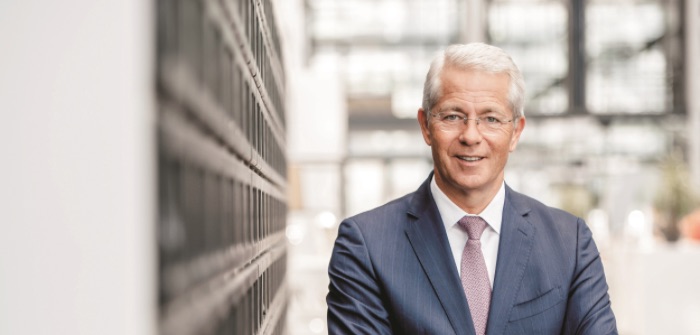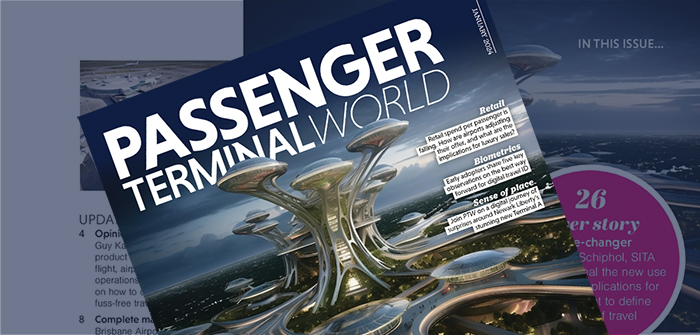Fraport’s CEO, Dr Stefan Schulte, sits down with PTW to share his thoughts ahead of opening next April’s Passenger Terminal Expo & Conference in Frankfurt, in an interview first published in the January 2024 issue of Passenger Terminal World magazine.
What is the most important aspect of your job? How has this changed?
My number-one priority is driving Fraport AG’s further development and success. But no matter how the world and our market develop, my colleagues on the executive board and I, despite having different responsibilities, must find the right answers to difficult questions as a team. While I play a guiding role as CEO, I don’t want to assert myself too much – because leadership always also means teamwork. Putting this principle into practice is especially important to me.
The biggest disruption was caused by the Covid-19 pandemic. From day one it became more important for me not only to represent the company very strongly toward the outside world, but – and this is key – also inwardly. I’m not saying that this wasn’t previously the case. However, the intensity and frequency with which the entire executive board team addressed all our employees increased massively. Above all it was important to us to reduce uncertainties by providing a clear assessment of the situation and explaining how our measures fitted in. As a result, the dialog with our employees reached a completely new level of quality that we now want to retain above and beyond the crisis.
Describe your role.
Fraport AG is one of the world’s leading companies in the airport business, with 29 airports on four continents. In the first nine months of 2023 alone we welcomed a total of more than 132 million passengers.
As the chairman of the executive board I head the Fraport Group, which has more than 18,000 employees at Frankfurt. In this role I am the board member responsible for Fraport’s international activities and services business segment. My duties include driving the development of our international portfolio within the scope of our Global Investments and Management division.
Currently we’re carrying out two major expansion projects. One is devoted to doubling capacity in Antalya on the Turkish Riviera, now that our concession there has been renewed. We have already completed more than half of the expansion project. We’re also continuing to drive the development of our airport in Lima, Peru, with the goal of turning it into South America’s most modern hub. A new terminal will begin operating right on schedule at the end of 2024 and take the travel experience to an entirely new level.
Alongside our organic growth we also want to extend our reach. Most recently we have succeeded in doing this via our subsidiary Fraport USA, which will manage retail spaces at the Dulles and Reagan airports (IAD and DCA) in Washington, DC, starting in 2024.
The other organizational units I’m responsible for include Airport Expansion South, Corporate Development and Sustainability, and Corporate Communications. The first of these coordinates all the work involved in expanding Frankfurt Airport, where we’re investing about €4bn in the new Terminal 3. When it begins operating in 2026 it will initially give us additional capacity for 19 million passengers in the south of the airport. As a result we will not only advance Europe’s largest privately funded infrastructure project but also lock in lasting growth prospects for Germany’s gateway to the world.
What are your key goals for 2024 and beyond?
We expect traffic volumes at Frankfurt to continue recovering in 2024. So here we’ll continue focusing on improving quality – especially where our ground handling processes are concerned. To achieve this we’re hiring more personnel and systematically expanding our training activities. Going forward, for example, it will be possible for individuals to achieve the highest qualification in aircraft loading by completing a one-year loadmaster training course.
Especially at many of the tourism-dominated Group airports outside Germany, we have made major progress in recovering from the Covid-19 pandemic. Our 14 Greek airports, for example, have surpassed the record in passenger volumes they set in 2019. We also want to achieve this elsewhere in 2024 – at Antalya on the Turkish Mediterranean coast, for instance.
Parallel to this, during my new term as CEO I’m concentrating on steadily reducing the large debt that the company accumulated as a result of the pandemic, making strategic adjustments where required, and successfully completing the already mentioned important projects for driving our future growth.
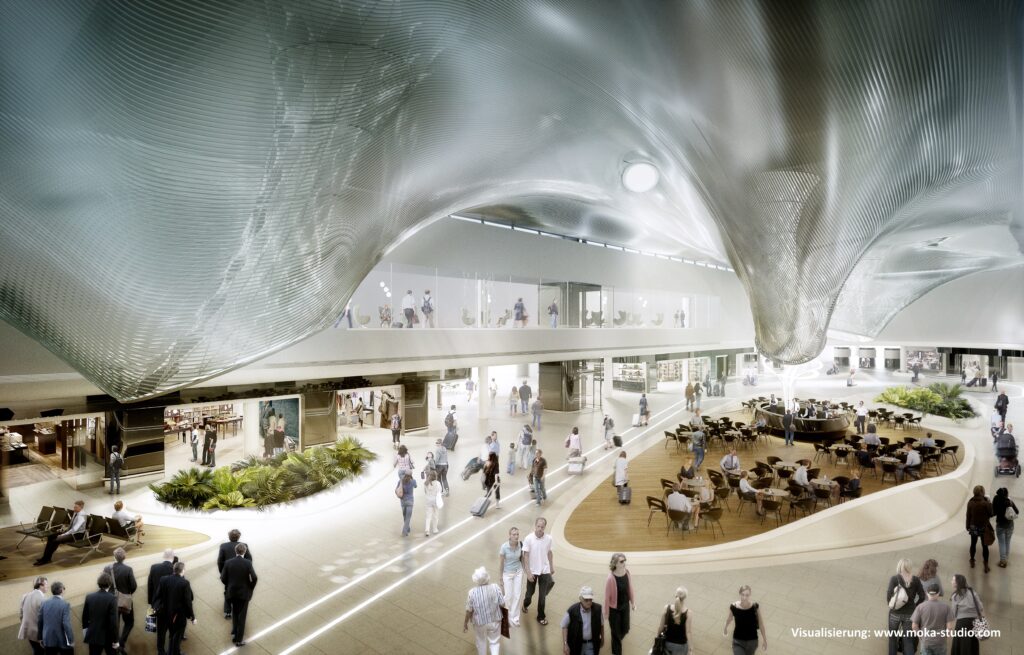
How important is growth? Do you have a plan for Frankfurt to become Europe’s busiest airport?
Let me start with Germany. In our home market Frankfurt is not only by far the largest airport, but it is also recovering faster than all our domestic competitors. This illustrates just how strong our market position is. In the 2023 summer season FRA was already being used again by 86 airlines. Our offering expanded to include 292 non-stop services to destinations in 92 countries. We have also achieved the world’s best hub connectivity, which is a key metric in the aviation industry.
However, presented out of context this distorts the picture somewhat, because where passenger volumes are concerned, in Europe we’re currently wobbling between fourth and fifth place. The German aviation market is lagging behind the average growth rate for Europe as a whole due to structural problems. Their main cause is the fact that point-to-point traffic is currently expanding outside the German market. Those market players are focusing on achieving growth in less competitive and – a very important aspect – lower-cost countries where they don’t have to bear substantial government-imposed costs such as aviation taxes and fees for air traffic management and security checks.
In addition, where domestic German travel is concerned, we’re seeing an accelerating shift away from air to rail. Deutsche Bahn’s Sprinter services in particular look attractive to business travelers. As a result, flight volumes within Germany are still far short of pre-crisis levels. As a multimodal hub we’re already well connected here with our very popular regional and long-distance railway stations. And as a result of the ongoing expansion in connection with the new Terminal 3, which will add capacity for up to 25 million passengers a year when completed, we’re excellently positioned to continue ramping up our passenger volume up to around 90 million a year. So in the medium term we expect to once again be among the top three largest hub airports in western Europe.
What have been the biggest challenges so far in your role?
The Covid-19 pandemic unleashed an unprecedented crisis throughout our entire industry. The aviation sector was the first to be affected and suffered repercussions more and longer than any other. When passenger volumes collapsed, dropping by more than 95% without anyone knowing how long it would last, and paralyzing highly complex infrastructure that was burdened by considerable fixed costs, airport operators burned through enormous sums of money. It was also painful for Fraport. Difficult decisions had to be made to quickly reduce the cash burn rate and stabilize the company. The measures included a comprehensive cost-reduction program. In addition to slashing material expenditures and introducing short-time work, the socially responsible reduction of our workforce by more than 4,000 employees was a major component. Those were very rough times for all of us at Fraport.
The insight from the pandemic that motivated me most was seeing how strong people’s wish was to resume traveling as soon as the restrictions were lifted. However, while this was a great feeling, the huge surge in demand that followed also faced us, as the airport’s operator, with major challenges while ramping up operations. We experienced month-on-month growth of up to 300%, requiring our employees to make a superhuman effort. I have the greatest respect for their performance in that situation. Right now, we’re concentrating on getting our operational quality back up to pre-crisis levels and reducing the debt burden that we were required to shoulder. I’m no longer losing any sleep over this, however, because we’re already heading in the right direction.
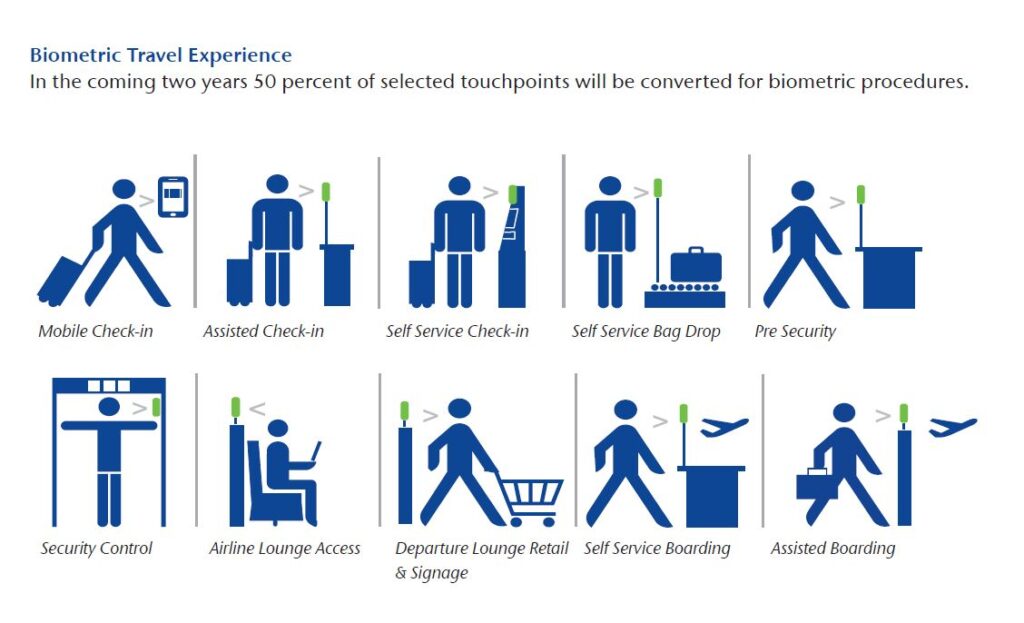
Where should airports be focusing their energy and investment?
Technological innovations will increasingly transform the travel process in the direction of a ‘seamless passenger journey’. One major game-changer is greater use of biometric processes (see image above and read the full article via the link at the end of this article). In the future, travelers will increasingly use their own faces as ‘door openers’ and be able to leave their boarding passes in their pockets. CT scanners will also let them clear security checks without having to take everything out of their carry-on bags. All these technical advances will combine to make flying easier than ever. The time passengers spend waiting will become less and less.
For us as an airport operator, it will therefore be increasingly important to combine and link all these technological innovations so as to improve the passenger experience to the point at which travelers can start relaxing at the airport and look forward to their trip without hassles and stress. And if they have more time for shopping or visiting a restaurant before boarding, our concessionaires will also be pleased.
Arrivals and departures at airports will also change. We see Frankfurt Airport not just as a leading international air traffic hub but also as a multimodal mobility hub. In other words, we’re focusing not only on providing the best-possible hub connectivity but also on optimally integrating all relevant transportation service providers in our processes, whether they operate by road, rail or eventually perhaps even as air taxis. Last but not least, the full range of modernization efforts is also important for sustainably reducing carbon emissions.
Can you give an example of a recent investment or innovation?
At the start of 2023 FRA became Germany’s first airport to take responsibility for planning, implementing and managing its own security checks, resulting in more satisfied customers. I personally regard this as a very important milestone, which we achieved in cooperation with the responsible federal ministry and the German federal police. It also means that we have now become a trendsetter in this area in our home market, and other airports are already following our example. We are now able to leverage our expertise as an airport operator even more directly for ongoing everyday management of the security check areas.
We’re also making progress in purchasing and installing state-of-the-art security technologies. As early as the spring of 2024, for example, we’ll start using 40 CT scanners at the checkpoints in Terminals 1 and 2. This translates into greater handling capacity per lane while maintaining or improving the current level of security. Our passengers are happy, since they can now clear the checks with less hassle and virtually no wait.
They can even reserve a slot for the security check in advance. This service is called FRA SmartWay and is quite popular. We are now also the world’s first airport to begin testing a walkthrough scanner that doesn’t even require passengers to stop.
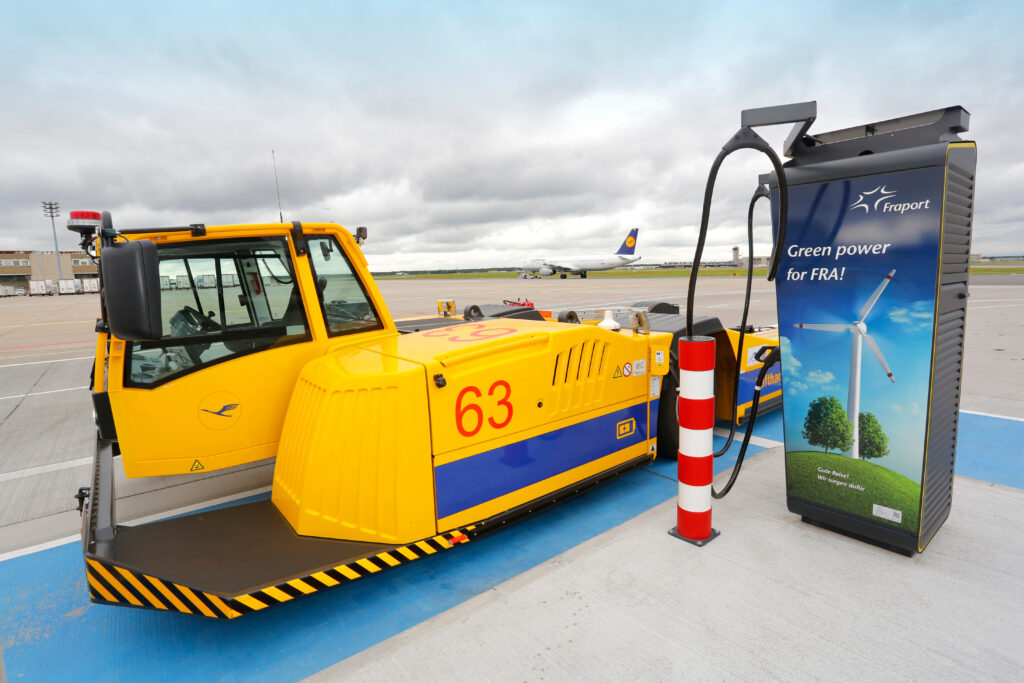
Finally, what is your message to fellow airports and their suppliers?
Well-performing aviation services are essential for intercultural sharing, for initiating and tending international business relationships, for traveling to other countries, and for visiting friends and family members who live far away. Airports are the most important nodes, marking the start and end of every – hopefully – good trip.
This ought to be motivation enough for all of us in the aviation industry to make a concerted effort to tackle future challenges. More than anything else, I’m talking about climate protection and the goal of steadily reducing our carbon footprint. At Fraport we drew up a decarbonization plan as early as 2022. It defines in detail numerous measures for achieving our goal: by 2045 at the latest, we want to be completely CO2 free across the group. We have already accomplished a lot along this path. At Frankfurt, by 2030 we will already have slashed our carbon emissions by over 75% compared with 1990 as the base year.
The individual measures and projects are also being coordinated better as time passes. One ongoing project involves establishing a solar park spanning over 30ha alongside one of our runways. The 37,000 photovoltaic modules installed so far output nearly 18MW of power. Our fleet of electric vehicles with regenerative drives is also steadily growing and poised to play an important role in a planned bidirectional charging system involving large-scale power storage that will be progressively expanded. In addition, in 2026 we will start meeting up to 85% of our power needs at Frankfurt from an offshore wind farm.
All these things are pieces of the puzzle that we are assembling to achieve our goals and actively contribute to shaping the future. And if our entire industry acts with similar commitment we will continue to be accepted and wholeheartedly enjoyed by all members of society and continue growing sustainably into the future.
A longer version of this article originally appeared in the January 2023 issue of Passenger Terminal World. To view the magazine in full, click here.

